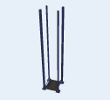Elevator
Overview and Key Concepts
The elevator is a special type of transport that moves flow items up and down. It will automatically travel to the level where flow items need to be picked up or dropped off. Flow items are animated as they enter and exit the elevator. This gives a better feel for the load and unload time of the elevator.

The elevator is a task executer. It implements offset travel by only traveling the z portion of the offset location. If the offset travel is for a load or unload task, then once the offsetting is finished, it will use the user-specified load/unload time to convey the flow item onto its platform, or off of its platform to the destination location. When conveying the item onto or off of the elevator, the flow item moves directly along the elevator's x-axis.
Context
Since the main distinction of an elevator is that it only moves along its z axis, this object can be used for any purpose in which you want the object to only travel along one axis.
Events
The elevator uses the standard events that are common to all task executers. See Task Executer Concepts - Events for an explanation of these events.
States
This object uses the task executer states. See Task Executer Concepts - States for more information.
Statistics
The elevator uses the standard statistics that are common to all task executers. See Task Executer Concepts - Statistics for an explanation of these statistics.
Properties
The elevator object has six tabs with various properties. These tabs are the standard tabs that are common to most task executers. For more information about the properties on those tabs, see: